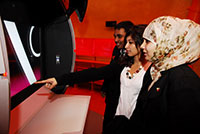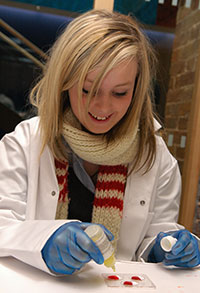Pathology: the science behind the cure

What is pathology?
Pathology is the study of disease. Pathologists work with doctors and nurses in hospitals and GPs' surgeries to diagnose, treat and prevent illness.
Isn't all about dead bodies?
 No, but you wouldn't be alone if you thought this. A survey found that over two thirds of people thought that pathologists worked only with the dead, as shown in television programmes like CSI and Silent Witness. In fact, although some pathologists do perform autopsies (also called 'post mortems'), this is only a small proportion of their work and the majority of pathologists work for the benefit of living patients. Every time someone has a blood test, cervical smear or a lump removed, it's a pathologist who looks at the specimen to work out if there's any disease present or not.
No, but you wouldn't be alone if you thought this. A survey found that over two thirds of people thought that pathologists worked only with the dead, as shown in television programmes like CSI and Silent Witness. In fact, although some pathologists do perform autopsies (also called 'post mortems'), this is only a small proportion of their work and the majority of pathologists work for the benefit of living patients. Every time someone has a blood test, cervical smear or a lump removed, it's a pathologist who looks at the specimen to work out if there's any disease present or not.
Pathologists don't all do the same job
There are 19 different specialties, with their own training programmes and exams. Pathologists work in laboratories, in clinics and on hospital wards.
The four main pathology specialties are histopathology (the study of disease in human tissue such as cancer), haematology (the study of disorders of the blood such as leukaemia ), clinical biochemistry (the study of chemicals in the blood and other fluids) and medical microbiology (the study of infection).
Other pathology specialties
 Some of the broader specialties include sub-specialties where pathologists have gone on to specialise in a particular area. Histopathology, for example, includes neuropathology (the study of diseases of the brain and nerves), dermatopathology (the study of diseases of the skin) and paediatric pathology (the study of disorders of babies and children).
Some of the broader specialties include sub-specialties where pathologists have gone on to specialise in a particular area. Histopathology, for example, includes neuropathology (the study of diseases of the brain and nerves), dermatopathology (the study of diseases of the skin) and paediatric pathology (the study of disorders of babies and children).
- Cytopathology is an important sub-specialty within histopathology. It involves studying cells to diagnose disease, for example following a cervical smear.
- Immunology is the study, investigation and treatment of disorders of the immune system such as immunodeficiencies, allergies and organ-transplant rejection.
- Forensic pathology is the specialty that most people have heard of. It involves the investigation of suspicious deaths, for example following murder.
- Genetics is the study of the underlying cause of disease, looking at the DNA in normal and abnormal cells to find out why a disease has developed and whether it might be passed on to the next generation.
- Toxicology is the study of drugs in the body tissues and fluids, for example working out if someone has been poisoned or taken an overdose.
- Virology is a sub-specialty of medical microbiology. It is the diagnosis and treatment of infections such as HIV and hepatitis.
- Veterinary pathology is the study and treatment of diseases in animals. Vets specialise in pathology after their general training, just as pathologists do.
What qualifications will I need?
 To work as a pathologist in any of the pathology specialties you need to qualify as a doctor first before going into pathology training.
To work as a pathologist in any of the pathology specialties you need to qualify as a doctor first before going into pathology training.
Pathologists are doctors who specialise in one of the pathology specialties after completing their basic medical training at medical school and as a junior hospital doctor. Many pathologists choose to complete further training in non-pathology specialties before entering pathology.
So to become a pathologist you need to go to medical school for 5 or 6 years first. You will need good A level results to get into medical school. Most students take a combination of maths, chemistry, physics and biology and obtain A grades.
How much could I expect to earn?
 Doctors in training earn a basic salary, In the most junior hospital trainee post (Foundation Year 1) the basic starting salary is £22,412. This increases in Foundation Year 2 to £27,798. For a doctor in specialist training the basic starting salary is £29,705.
Doctors in training earn a basic salary, In the most junior hospital trainee post (Foundation Year 1) the basic starting salary is £22,412. This increases in Foundation Year 2 to £27,798. For a doctor in specialist training the basic starting salary is £29,705.
Consultants can earn a basic salary of between £74,504 and £100,446 per year, dependent on length of service.
For more information please visit
You don't have to be a doctor…
In addition to medically qualified pathologists who have completed a medical degree, there are other types of experts are also needed within the various pathology specialties:
- Clinical scientists are skilled science graduates who work in areas such as clinical biochemistry and clinical embryology. They may be responsible for all aspects of the work of a laboratory and work alongside medically qualified colleagues.
- Biomedical scientists are also science graduates and work in specialties such as histopathology and haematology. Their expertise is in performing the millions of tests that are carried out in laboratories every year.
- Medical technical officers provide technical support and work in specialised areas such as the mortuary.
- Medical laboratory assistants provide technical assistance in laboratories and play an important role in the work of a pathology laboratory.
- Cervical cytology screeners are the highly skilled people who examine cervical smears and other cytology specimens, helping to make the UK Cervical Cancer Screening Programme the best in the world.
- Phlebotomists take blood from patients for testing and may be involved in point-of-care testing at patients' bedsides.
You can find out more about pathology at the Royal College of Pathologists or on our Facebook page.

